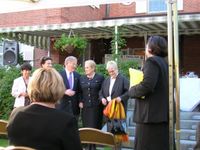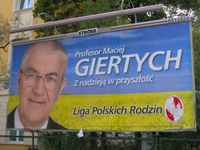The Women of Summer 1980 - 25 Years On
The Women of Summer 1980 - 25 Years On
News Polandby
Jordan Seidel Solidarity for at least 90 minutes
Solidarity for at least 90 minutes
When asked what he wanted to be when he grew up, Barbara Labuda’s young son said that he wanted to be a political prisoner. That was at the height of the Solidarity movement in Poland, today he is a “good human being,” according to his mom (the current Polish Secretary of State). But his answer was perfectly fit for those times, from a child’s perspective, his parents were both active underground participants ('dissidents') during Poland’s resistance to Communist rule in the eighties, and both found themselves in jail, often alternating their incarceration.
On August 29th, the
USA Ambassador to Poland, Victor Ashe, hosted a special, first of its kind, conference at his residence in Warsaw. According to the conference participants, this was the first official recognition of the role of women in sustaining Solidarity through martial law. Among the attending and conspicuous dignitaries was former USA Secretary, Madeleine Albright (although she didn’t ‘steal the spotlight’ or make any remarks during the conference). A few Ambassadors of other countries were also recognized, among them Lithuania and Costa Rica. Also present were quite a few key players during Solidarity, they were in the audience and acknowledged by the main conference participants.
 Shana Penn, Ambassador Ashe, Madeleine Albright, Barbara Labuda
Shana Penn, Ambassador Ashe, Madeleine Albright, Barbara LabudaThe three main participants were author
Shana Penn, whose recent work “
Solidarity's Secret: The Women Who Defeated Communism in Poland” was about the activities of the female editors of the Solidarity underground weekly
Tygodnik Mazowsze. One of those editors, and participants was
Helena Łuczywo [Wikipedia link problem], currently Deputy Editor-in-Chief of
Gazeta Wyborcza newspaper (which she helped found in 1989). Before martial law, Łuczywo had managed the Solidarity Press Agency, and before its inception, she was acting editor of
Robotnik, a workers' publication she founded. And finally, mentioned earlier,
Barbara Labuda currently serves as the Secretary of State in the Chancellery of the President of Poland, a position she has held since 1998. She was elected to the Sejm in 1989 after decades of political work. During martial law, Ms. Labuda was one of the leaders of the underground opposition in Wrocław. She was active in Solidarity from its earliest days, previously working with the Committee for the Defense of Workers.
 Helena Łuczywo, Shana Penn, Ambassador Ashe, Madeleine Albright, Barbara LabudaSandwiches in the Shipyard and The Teller Revolution
Helena Łuczywo, Shana Penn, Ambassador Ashe, Madeleine Albright, Barbara LabudaSandwiches in the Shipyard and The Teller Revolution
According to Labuda, the dominant images of women during Solidarity were connected with activities like “weeping, praying, cleaning floors…making sandwiches.” But this was only a part. Labuda claimed that of the estimated 10 million strong members of Solidarity, half were women – however, and this would have influenced the media’s lens, only 8% of Solidarity leadership was women. During Martial Law (1981-1983) women understood their role as ‘patient revolutionaries.’ An underground paper was published (
Tygodnik Mazowsze - up to 80,000 illegal copies each issue) by women to keep the voice of the movement strong serving to take away the government’s monopoly on information. Women maintained a Polish version of the underground railroad with networks of safe houses to hide Solidarity men. Interestingly, cultural blinders in the form of sexism was one of Solidarity’s biggest allies (and Achille’s Heel) since the Secret Police sought dissident men. Labuda stressed that women were overlooked, “the government’s sexism became our secret weapon.” Labuda presented Solidarity women as a backbone of the movement with the long view in mind, this was not the time for dramatic revolution. She referred to it as a “Teller Revolution” in which crucial information was shared in daily chatter and usually without much attention paid by the public, or official bosses within earshot.
 An enthusiastic audienceThe Fight for Democracy, Treason, and the Decline of the Left
An enthusiastic audienceThe Fight for Democracy, Treason, and the Decline of the Left
Helena Łuczywo presented the issue more broadly, looking from a global perspective and how women fight for Democracy everywhere. Using Poland and her role during Martial Law as an example, she said that thousands of women were involved, mostly participating behind the scenes, but not always. She mentioned the radio station launched by women in Poznan. Łuczywo made sure to mention that both women
and men were necessary for the success of the movement and that the recognition of the role of women in Solidarity is not intended to displace or compete with men – simply to recognize and add historical equity. She also made some critical comments about the ironies of the success of Solidarity – reflecting that the “people who actually sustained and started the movement have become its biggest victims.” We mustn’t forget Łuczywo said, that Solidarity was a working class movement (referring to
Robotnik).Will the neo-communists in Poland, ironically, attract these disenfranchised people? She spoke of a treason and that the Left is dying, not only in Poland – there is too little solidarity. “Is this tradition over?” she asked.
Solidarity Today: What’s the Significance?
There were two streams, or threads active in the questions that ensued. One line of thinking looked at the implications of Solidarity for women today. When asked by an audience member, “Where are all the women in public life?” Barbara Labuda said that she frankly didn’t know and was perplexed by the dearth of women in public life. The other line of thought focused more on the quotidian factors brought on during Martial Law, women were responding to real issues of daily importance – the problems were brought right into their homes and they had to respond. The issue wasn’t painted with such broad historic overtones – they weren’t only fighting for democracy buy simply trying to keep their loved ones from being arrested, or getting the next print edition of
Tygodnik Mazowsze distributed. Labuda said that having a child during this time was very difficult, and presaged the modern day dilemma of choosing between family or career faced by many women in Poland today. Shana Penn noted that the question regarding the absence of women in public life should not only, if ever, be addressed to women, but rather to men. Now, as during Solidarity, women are not in the public spotlight. However, for at least ninety minutes, on the 25th anniversary of Solidarity, it was women giving a public voice to a movement that defeated communism -- it appeared that history, and how it is perceived, doesn’t have to repeat itself.
 25 Years Young
25 Years Young **
Editor's Note: Several hundred photographs capturing recent history of Poland are on display at the National Museum in Warsaw Aug. 29-Sept. 18. They were taken during the stormy 17 months between August 1980, when NSZZ Solidarity trade union was created, and December 1981, when martial law was imposed in Poland. ~ Source:
Warsaw Voice******************************************************
PolBlog - News Poland 24/7
Poland's first (almost) daily English-language news blog.
Read the news then share your views

FAIR USE NOTICE This article contains copyrighted material, the use of which has not always been specifically authorized by the copyright owner. We are making such material available in the efforts to advance understanding of Poland's economic, environmental, human rights, political, scientific, and social justice issues, among others. We believe this constitutes a 'fair use' of any such copyrighted material as provided for in section 107 of the US Copyright Law. In accordance with Title 17 U.S.C. Section 107, the material in this article is distributed without profit for research and educational purposes.
PolBlog's "Caption This!"
PolBlog's "Caption This!"
 Captionable
Captionable
Submit your best caption using your humor, wits, and creativity (and knowledge of Polish/Poland). Click on image to enlarge. Powodzenia!
******************************************************
PolBlog - News Poland 24/7
Poland's first (almost) daily English-language news blog.
Read the news then share your views

FAIR USE NOTICE This article contains copyrighted material, the use of which has not always been specifically authorized by the copyright owner. We are making such material available in the efforts to advance understanding of Poland's economic, environmental, human rights, political, scientific, and social justice issues, among others. We believe this constitutes a 'fair use' of any such copyrighted material as provided for in section 107 of the US Copyright Law. In accordance with Title 17 U.S.C. Section 107, the material in this article is distributed without profit for research and educational purposes.
PolBloglet: Lech, the Family Man
PolBloglet: Lech, the Family Man
News Poland Another PolBloglet
Another PolBloglet With elections a month away (or less), political billboards in Warsaw are in bloom. Here is one we caught in town. The design is quite different from the standard boilerplate potrait styles. Double-click to get a better look, we translated the Polish slogan into the English caption below the photo. Notice the ever so vogue orange color and the soccer ball (Europe's paradigmatic sport), and of course the men as bookends - nice traditional family.
 "Family, Fairness, Future"
"Family, Fairness, Future"
 A bolierplate political portrait poster -It says "With Hope into the Future"But perhaps "Back to the Future?"
A bolierplate political portrait poster -It says "With Hope into the Future"But perhaps "Back to the Future?"******************************************************
PolBlog - News Poland 24/7
Poland's first (almost) daily English-language news blog.
Read the news then share your views

FAIR USE NOTICE This article contains copyrighted material, the use of which has not always been specifically authorized by the copyright owner. We are making such material available in the efforts to advance understanding of Poland's economic, environmental, human rights, political, scientific, and social justice issues, among others. We believe this constitutes a 'fair use' of any such copyrighted material as provided for in section 107 of the US Copyright Law. In accordance with Title 17 U.S.C. Section 107, the material in this article is distributed without profit for research and educational purposes.
News Poland Another PolBloglet
Another PolBloglet [U]nder the patronage of the former Polish President and the chairman of National Co-ordinating Committee of Independent Trade Union \'Solidarnosc\' Mr Lech Walesa.
e-solidarity is designed be an international discussion board, that will make it possible for different cultures to get more acquainted with each other.
From the actual site:
On 31 August 2005 in Gdańsk, we will celebrate the 25th Anniversary of the establishing of Solidarity – the powerful social movement which changed the face of the Earth.
On 31 August 2005 – under the auspices of Mr Lech Wałęsa – a new platform for dialogue will be made available for the internet users of the world:
www.esolidarity.com
Lech Wałęsa has invited over 100 television stations, radio stations and press titles from many countries to formulate and present the QUESTIONS TO THE WORLD.
Source: Poland Development Gateway

FAIR USE NOTICE This article contains copyrighted material, the use of which has not always been specifically authorized by the copyright owner. We are making such material available in the efforts to advance understanding of Poland's economic, environmental, human rights, political, scientific, and social justice issues, among others. We believe this constitutes a 'fair use' of any such copyrighted material as provided for in section 107 of the US Copyright Law. In accordance with Title 17 U.S.C. Section 107, the material in this article is distributed without profit for research and educational purposes.
News Polandin from
Brainsnap:
Poland has been quietly building its own strength. Analysts believe that within five years it could replace the United States as the world’s greatest super power...
Time’ magazine published last week an article entitled, ‘Where the Hell Did Poland Come From?’ [can't find it]...Poland has surprised the world with its rapid advance.According to ‘Time’, its economy is now the third largest in Europe, and growing so rapidly that it will outstrip Germany and the United Kingdom in less than a year.
Poland’s military power is also on the increase. Once the pawn between the two neighboring powers, Germany and Russia, Poland’s armed forces are swiftly emerging as the most technologically advanced in Europe.
Already, Polish courses at major American and European universities have tripled enrolments. Some even argue that Polish may replace English as the major international language of business and communication. “It’ll take a while, but by 2030 it is very possible that Polish will be the most important language on the globe,” MIT linguistics specialist Paul MacNamer told ‘Time.’
Source:
Is Poland the Next World Super Power?View: "Beam me up Scotty!" (God rest his soul) I should have immediately been incredulous when I noted the source of this post - "
Brainsnap." Yes, folks, a good description of this article. Is this for real!? Walking the streets of Warsaw, one doesn't get a sense of a people on the verge of obtaining gonzo power status. The first claim is at least plausible, Germany is looking East to invest substantially in Poland's economy (i.e. cheap land, labor, lower interest rates) which will give a boost. Poland is becoming an
attractive investment, that much is true.
But taking the cake is the claim about Polish replacing English as the international language of business. Did April Fool's Day come early? Besides the lack of a critical population mass necessary to bringing Polish outside of Poland (perhaps Chicago), I don't see a real interest in Poland for foreigners to learn the language (the dreaded grammar for Westerners). I think that more non-Poles speak Esperanto than speak Polish -- although Esperanto (an export of Poland) might have a better chance at lingua franca status than Polish (some millenium). Not to mention, oops, the huge English language industry here in Poland.
Aside from this, a few words come to mind that interrupt any thought of Poland's ascent to world and word power status -- No seat on Security Council, Sickly Health Care System, Corruption (Rivin-Gate, Orlen-Gate), Corruption (Privatization of PZU), almost totally homogenous religiously and ethnically, and let's not forget those Polish Tourist Industry ploys (Polish Plumber and Nurse).
I just don't see the world power outlook present in the lives of Poles I meet here. Sure, there is national pride (think Pope John Paul II, Solidarity, Warsaw Uprising...). But the fact that many Poles (in Warsaw) are relieved to be in the EU, speaks to insecurity and anxiety about the future rather than a clear and independent sense of itself and its role in the world.

FAIR USE NOTICE This article contains copyrighted material, the use of which has not always been specifically authorized by the copyright owner. We are making such material available in the efforts to advance understanding of Poland's economic, environmental, human rights, political, scientific, and social justice issues, among others. We believe this constitutes a 'fair use' of any such copyrighted material as provided for in section 107 of the US Copyright Law. In accordance with Title 17 U.S.C. Section 107, the material in this article is distributed without profit for research and educational purposes.
PolBloglet: EU and Plan D(irection)?
PolBloglet: EU and Plan D(irection)?
News Poland Another PolBloglet
Another PolBloglet Following up on the ealier polblog about Plan D and Poland:
On 29 June, ECAS held a brainstorming meeting of its Board and a seminar (see report) at which it was decided to open our Hotline. You can participate by filling in the questionnaire and mail it back to us (c.gonthier@ecas.org ). The aim of the Hotline is to collect ideas and proposals about how the debate should be organized, what should be the themes, where it should lead, and to make a report to the EU Institutions.
Those that have replied so far stressed that the debate should be initiated for citizens by citizens – bottoms up rather than a top-down approach. Therefore your views will count.
Read here our Press Release
See here the 50 Questions and Answers
Link to the survey ---> HERE
******************************************************
PolBlog - News Poland 24/7
Poland's first (almost) daily English-language news blog.
Read the news then share your views

FAIR USE NOTICE This article contains copyrighted material, the use of which has not always been specifically authorized by the copyright owner. We are making such material available in the efforts to advance understanding of Poland's economic, environmental, human rights, political, scientific, and social justice issues, among others. We believe this constitutes a 'fair use' of any such copyrighted material as provided for in section 107 of the US Copyright Law. In accordance with Title 17 U.S.C. Section 107, the material in this article is distributed without profit for research and educational purposes.
EU Apathy and Russiaphobia
EU Apathy and Russiaphobia
 Jaded for freeby Jordan Seidel
Jaded for freeby Jordan Seidel The collective yawn from the EU regarding the recent Polish-Russian mutual beatings, overshadows the Russiaphobia in Poland. The utter invisibility of the story on the major networks (e.g. I haven't seen any news about this on CNN or BBC lately) again raises questions about how much unity exists in Europe.
Imagine the scene if a group of young skinheads in Berlin beat three children of Russian diplomats? And then if two German diplomats, and one prominent journalist were beaten in Moscow? We would see nothing else on major news networks and the EU chambers in Brussels would be mushrooming with panels and fact finding teams to both ease tensions and raise awareness of the negative effects of ignorance and ill-will. We would also see Britain and France weighing in on the issue -- and Poland too would have something to say no doubt.
But alas, this seems to be a backyard dispute between neighbors. What exactly is the EU community for if not to act as mediator and support for its members? In case someone forgot, Poland is an EU member now and should be given the same attention and regard as any other member. It was just this year that the EU was vigorously involved in the so-called Ukraine Orange Revolution and also had some things to say to Russia about it. What happened now that an actual EU member is wrangling with Russia? This isn't Iran or Iraq, it's an issue happening right in EU territory at one of its most important borders.
The media is to blame as it has seemingly shaped the issue in such a way that the actual beatings have taken on the appearance of a local brawl -- such headlines like 'gang war' - conjure images of anarchy and simple minded retribution. The Wild East all over again. But where is the sherrif?
**Editor's note
: Another blog on this issue ---> Post Title "
More trouble in the east"
******************************************************
PolBlog - News Poland 24/7
Poland's first (almost) daily English-language news blog.
Read the news then share your views

FAIR USE NOTICE This article contains copyrighted material, the use of which has not always been specifically authorized by the copyright owner. We are making such material available in the efforts to advance understanding of Poland's economic, environmental, human rights, political, scientific, and social justice issues, among others. We believe this constitutes a 'fair use' of any such copyrighted material as provided for in section 107 of the US Copyright Law. In accordance with Title 17 U.S.C. Section 107, the material in this article is distributed without profit for research and educational purposes.
News Polandin from
European Citizen Action ServiceFollowing referenda results in France and the Netherlands, the European Council has called for a 'period of reflection to enable a broad debate to take place in each of our countries, involving citizens, civil society, social partners, national parliaments and political parties.' What they did not say is how to organise this debate!
ECAS is collecting opinions from all willing contributors. Through the questionnaire we have already received very interesting propositions on how to organize the debate, what it should be about, possible actors and their respective roles.
Most believe a bottom up approach can best channel people’s views and ideas. That implies local authorities and civil society to lead while the European Institutions would have an enabling role. A European forum could be created in regions. A new Convention could be elected. What do you think?
It is in this spirit that ECAS launches the Hotline. We invite you to fill up the questionnaire and give us your insights and opinions on the future of Europe.
Results will be examined and explored to produce a report which will be submitted to the EU Institutions in early September.
View: I don't know how much exposure this issue is getting in Poland's MSM (mainstream media), but I haven't heard anything that would inform Poles about this new project to gather EU citizen opinions and attitudes about issues such as immigration and the EU Constitution. The
ECAS organization is launching this Hotline as a way to measure what EU citizens think is the best way to talk about (to Debate) the hot issues in Europe. Another
report from ECAS reveals a perception/reality gap on the issue of enlargement and fear of an immigration deluge Westward -- in fact, free movement of citizens from new to older member states is reported to be under 1%.
You can read the report summary and actually answer a survey to help them fill in the information gaps they have on newer countries regarding migration. After the 'Polish Plumber' story and how it may have influenced the 'no' vote in France and Netherlands, it's important that Poles register their voices in this ongoing and developing debate. But as usual most Poles seem apathetic to this -- it might have something to do with all the billboards mushrooming around Warsaw with Polish politicians and their families begging us for their vote (Did you see the billboard on Lech Kaczyñski? A little scary -- but obviously communicating its message nicely)
*Editor's note
: A useful summary of the topic (with good reportage on Poland) can be found on EUobserver.com --->
HEREUPDATE: I sent a letter to ECAS and received the attached response. Apparently, Poland is one of their targets (read bold print below) -- but will Poles be interested enough?
********************************************************
Dear Jordan,
Let me first thank you for your interest and support. It is especially important to us to promote the phone number and the email of the hotline in Poland, as Polish citizens are amongst the ones to use the most their rights to free movement. They thus encounter a greater amount of problems, and can make good use of the hotline service. During last year’s hotline, we received a large majority of Polish cases and questions. We strongly hope to continue to provide this legal advice service to Polish citizens.
If you could send the report and the press release to any of your contacts within interested organizations, the media, public administrations, experts, etc, that would be the best way to contribute to this initiative. The aim is to promote access to the hotline by putting forward the phone number and the email address.
The hotline has started yesterday, Thursday 11th August, and we have a small month to gather the maximum of questions and cases to present those to the European Parliament on 6 September.
Don’t hesitate to contact me directly. Here is my mobile number: 0032 474 77 99 64. Many thanks for your support, it means a lot to us.
Caroline
Caroline Gonthier
Press Officer
ECAS
Prince Royal 83
B-1000 Brussels
Tel: 02 548 98 23
Fax: 02 511 90 87
Email: c.gonthier@ecas.org

FAIR USE NOTICE This article contains copyrighted material, the use of which has not always been specifically authorized by the copyright owner. We are making such material available in the efforts to advance understanding of Poland's economic, environmental, human rights, political, scientific, and social justice issues, among others. We believe this constitutes a 'fair use' of any such copyrighted material as provided for in section 107 of the US Copyright Law. In accordance with Title 17 U.S.C. Section 107, the material in this article is distributed without profit for research and educational purposes.
Contaminated Land Law: Poland's Expensive Experiment
Contaminated Land Law: Poland's Expensive Experiment
******************************************************
News Poland
by Randall M. Mott
POLAND’S CONTAMINATED LAND LAW: SYNOPSIS & ISSUES
Poland was required to adopt many environmental requirements from the European Union as a condition of being admitted last year, but one of the most onerous and costly environmental laws recently going into effect was a national choice unrelated to EU requirements, the Contaminated Land Law. 2/ This law now requires the owner of land to “remediate” any contamination found on the property. If the landowner can show that the contamination was entirely the result of another party’s actions, then that party is also liable for remediation. Landowners were required to notify the starost where contamination pre-dated the act and “was caused by another entity” by June 30, 2004. Article 12. If the Starost concludes that this occurred in a formal decision, then the liability under Article 102, sections 1 through 3 shall not apply. This was a onetime chance to get a pass of the remedial obligations of the law. Presumably the party causing the contamination may still be liable under Article 102. Decisions rejecting any application under Article 12 were due to be completed by June 30, 2005.
The Starost has other responsibilities under the law, including to prepare decisions on cleanup and their costs, to actually perform cleanup if the responsible party cannot get access to the land, and to take emergency actions where “irreversible damage to the environment” requires immediate action. The law authorizes the Starost to require sampling by the liable party. Where the Starost conducts the cleanup, the law also requires the landowner to provide access. The obligations of the Starost to “conduct periodic testing of the quality of soil and earth” seem a little broad and are not tied to any specific sites. This may be intended, since the statute requires a Starost registry of areas where the quality standards are exceeded. Starost remedial actions are to be scheduled and cleared by the Powiat enviornmental protection program.
Contamination of the land shall be restored to “quality standards” set by the Ministry of Environmental Protection. “The quality standard shall set out the concentration of certain substances in the soil or earth below which none of the functions served by the land surface is impaired.” A key provision that narrows the cleanup scope provides that the intended functions by “actual development and land use” or the “results from a land-use plan.” The quality standards themselves are also to take into account the type of land “according to the criteria of their current or planned functions. The standards should also differentiate based on “water permeability and depth.” In requiring that the test reference methods be specified in the rules, the law also requires specification of the methods for “modeling the migration of substances in soil and earth.” This is normally a technique used to conduct risk assessments, which will have to be used for land contaminated before September 30, 1980 under the “grandfather” clause of the law. For these sites, the remediation may be limited to actions needed to prevent either “(1) a threat to human life or health or the origination of other damages” or “(2) the possibility of the pollution’s spreading.” The question logically arises as to why remediation under the rest of the Act is necessary if there is no threat to human health and the pollution cannot possibly spread.
The regulations on the quality standards were published on September 9, 2002. See Minister of Environment Regulations on Soil and Sub-Soil Quality Standards of 9 September 2002. They divide land use into three categories: protected areas under environmental or water resource laws, agricultural land, and industrial property. Different numbers are used for each compound or group of compounds based on the soil permeability and depth. A sobering fact in the rules is the depth goes down to 15 meters. The numbers are generally higher in most cases for industrial property compared to U.S. and other countries’ guidelines.However, there are no attenuation factors or risk considerations or apparent basis for more flexible adjustments due to specific site conditions. This rigidity makes these rules more extreme than anywhere else in the EU. The existence of this regulatory approach has already had significant negative effects on new investment projects in Poland. The Polish law is clearly more rigid, costly and inflexible than any other Central European country’s rules.
Similar early rules in the United States and Holland led to the near abandonment of investment in heavily industrialized areas. Buyers simply avoided acquiring land where cleanup problems could lead to very substantial expenditures unrelated to their core business investment. Virtually all states have moved toward risk-based standards and followed the U.S. EPA Brownfields Initiative.” The U.S. EPA website has considerable information that may be useful to groups interested in this approach in Poland, where it seems to clearly make even more sense than in the United States. See http://www.epa.gov/brownfields.
Although the European Union has no retroactive environmental cleanup law, it does have an Environmental Liability Directive that has prospective application. The Directive is also mandatory for member states to implement by 2007 and it specifically requires risk-assessment be used for clean-up decisions:
“For the purposes of assessing damage to land as defined in this Directive the use of risk assessment procedures to determine to what extent human health is likely to be adversely affected is desirable.” Findings, par. 7, Directive 2004/35/CE
Technical groups working on the EU program have found that “risk based decision making is the best available paradigm for dealing with the problems posed by land contamination.” The Danish EPA web-site in discussing Poland’s contaminated land notes: “Land contamination per se does not always pose a threat to the environment, and the importance of the contamination can only be determined following detailed investigation and site specific evaluation of risks.”
Besides the unnecessary additional economic burdens that it places on the Polish economy, there are important practical reasons for changing that provision of the law. First, Poland will have to develop the risk assessment expertise to make decisions for pre-1980 contamination in any event. Second, Poland will have to use EU-approved risk assessment techniques under the EU Directive on Environmental Liability as well by April 30, 2007.
Anyone looking at this law will immediately see some practical issues that cannot be overlooked. The cost of sampling for these compounds in any investigation will be quite significant. The role assigned to the Starost authorities is quite unrealistic. And many legal issues also arise because of very limited statutory guidance. While a landowner who can prove he contamination predated the law might convince the Starost of this fact, when the same landowner digs a new foundation or utility-line and re-deposits the contaminated soil then it can be argued that it is new contamination caused by the landowner after the date of the law. What other parties will be deemed as “causing” the contamination? If the landowner notified for an exemption, but the other parties involved in causing the contamination did not (a tenant, a waste producer, a waste transporter), are all parties exempt? If the landowner is exempt under the Contaminated Land Law, will he face liability under the Waste Law, since EU law currently defines contaminated soil as a waste? 3/ How can a company prove that the contamination was done entirely before September 1980 [analytical testing of samples will not produce this information]? If the contamination was pre-1980, when will the Starost be justified in alleging that there is a health threat or a real risk of migration? How will contractual provisions between the parties affect their statutory liability? What will insurance cover on this loss? What impact does in have on property used at collateral for loans?
These issues are all beyond the scope of this article, but they will need answers. And the answers may not come quickly or without some substantial litigation over the meaning and impact of the law. Hopefully, the business coalition being organized to amend the law can address many of these problems in the near future with revisions by the legislature to make the Polish rules more consistent with the EU practices.
Randall Mott
1/ Mr. Mott is an attorney/consultant affiliated with Kalwas and Partners, Warsaw, Poland and has been active in hazardous waste matters since 1978.
All rights reserved @.
2/ Environmental Protection Act of 27 April 2001 (the „EPA”); The Act on the Entry into Force of the EPA and the Waste Act of 27 July 2001 ( the „Transitional Act”); Minister of Environment Regulations on Soil and Sub-Soil Quality Standards of 9 September 2002.
3/ See European Court of Justice, Van de Walle et al. Case C 1/03, September 7, 2004 (sustaining a criminal claim for “disposal” of oil-contaminated soil from service station accidentally leaking tank even if it was not excavated). This extreme result is an issue now being addressed by the European Commission for possible changes.
*******************************************************************
PolBlog - News Poland 24/7
Poland's first (almost) daily English-language news blog.
Read the news then share your views

FAIR USE NOTICE This article contains copyrighted material, the use of which has not always been specifically authorized by the copyright owner. We are making such material available in the efforts to advance understanding of Poland's economic, environmental, human rights, political, scientific, and social justice issues, among others. We believe this constitutes a 'fair use' of any such copyrighted material as provided for in section 107 of the US Copyright Law. In accordance with Title 17 U.S.C. Section 107, the material in this article is distributed without profit for research and educational purposes.
News Poland Another PolBloglet
Another PolBloglet Speaking with many Polish students here in Warsaw, I hear mixed opinions. Some intend to work abroad, some want to stay here (quite a few law students). As far as university study goes, I don't hear so many students talk about learning abroad. This might only be a feasible option for the cream of the crop (re: those who can compete for scholarships). But on the flip side, Poland is attracting bright foreigners -- I think of teachers & exchange students -- and many end up staying here.
Polish secondary school graduates are taking foreign universities by storm, but will they ever come back? writes the Polish version of Newsweek, pointing out that it is the intellectual potential rather than the industry that makes nations powerful.
Source:
Radio Polonia

FAIR USE NOTICE This article contains copyrighted material, the use of which has not always been specifically authorized by the copyright owner. We are making such material available in the efforts to advance understanding of Poland's economic, environmental, human rights, political, scientific, and social justice issues, among others. We believe this constitutes a 'fair use' of any such copyrighted material as provided for in section 107 of the US Copyright Law. In accordance with Title 17 U.S.C. Section 107, the material in this article is distributed without profit for research and educational purposes.























